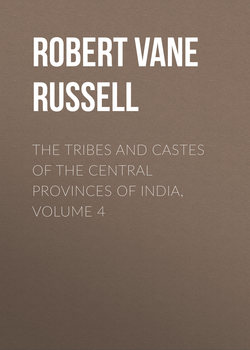Читать книгу The Tribes and Castes of the Central Provinces of India, Volume 4 - Robert Vane Russell - Страница 121
Part II
Articles on Castes and Tribes
Kumhār—Yemkala
Vol. IV
Mahār
13. Social subjection
ОглавлениеThe social position of the Mahārs is one of distressing degradation. Their touch is considered to defile and they live in a quarter by themselves outside the village. They usually have a separate well assigned to them from which to draw water, and if the village has only one well the Mahārs and Hindus take water from different sides of it. Mahār boys were not until recently allowed to attend school with Hindu boys, and when they could not be refused admission to Government schools, they were allotted a small corner of the veranda and separately taught. When Dher boys were first received into the Chānda High School a mutiny took place and the school was boycotted for some time. The people say, ‘Mahār sarva jātīcha bāhar’ or ‘The Mahār is outside all castes.’ Having a bad name, they are also given unwarrantably a bad character; and ‘Mahār jātīchā’ is a phrase used for a man with no moral or kindly feelings. But in theory at least, as conforming to Hinduism, they were supposed to be better than Muhammadans and other unbelievers, as shown by the following story from the Rāsmāla:132 A Muhammadan sovereign asked his Hindu minister which was the lowest caste. The minister begged for leisure to consider his reply and, having obtained it, went to where the Dhedas lived and said to them: “You have given offence to the Pādishāh. It is his intention to deprive you of caste and make you Muhammadans.” The Dhedas, in the greatest terror, pushed off in a body to the sovereign’s palace, and standing at a respectful distance shouted at the top of their lungs: “If we’ve offended your majesty, punish us in some other way than that. Beat us, fine us, hang us if you like, but don’t make us Muhammadans.” The Pādishāh smiled, and turning to his minister who sat by him affecting to hear nothing, said, ‘So the lowest caste is that to which I belong.’ But of course this cannot be said to represent the general view of the position of Muhammadans in Hindu eyes; they, like the English, are regarded as distinguished foreigners, who, if they consented to be proselytised, would probably in time become Brāhmans or at least Rājpūts. A repartee of a Mahār to a Brāhman abusing him is: The Brāhman, ‘Jāre Mahārya’ or ‘Avaunt, ye Mahār’; the Mahār, ‘Kona dīushi neīn tumchi goburya’ or ‘Some day I shall carry cowdung cakes for you (at his funeral)’; as in the Marātha Districts the Mahār is commonly engaged for carrying fuel to the funeral pyre. Under native rule the Mahār was subjected to painful degradations. He might not spit on the ground lest a Hindu should be polluted by touching it with his foot, but had to hang an earthen pot round his neck to hold his spittle.133 He was made to drag a thorny branch with him to brush out his footsteps, and when a Brahman came by had to lie at a distance on his face lest his shadow might fall on the Brāhman. In Gujarāt134 they were not allowed to tuck up the loin-cloth but had to trail it along the ground. Even quite recently in Bombay a Mahār was not allowed to talk loudly in the street while a well-to-do Brāhman or his wife was dining in one of the houses. In the reign of Sidhrāj, the great Solanki Rāja of Gujarāt, the Dheras were for a time at any rate freed from such disabilities by the sacrifice of one of their number.135 The great tank at Anhilvāda Pātan in Gujarāt had been built by the Ods (navvies), but Sidhrāj desired Jusma Odni, one of their wives, and sought to possess her. But the Ods fled with her and when he pursued her she plunged a dagger into her stomach, cursing Sidhrāj and saying that his tank should never hold water. The Rāja, returning to Anhilvada, found the tank dry, and asked his minister what should be done that water might remain in the tank. The Pardhān, after consulting the astrologers, said that if a man’s life were sacrificed the curse might be removed. At that time the Dhers or outcastes were compelled to live at a distance from the towns; they wore untwisted cotton round their heads and a stag’s horn as a mark hanging from their waists so that people might be able to avoid touching them. The Rāja commanded that a Dher named Māyo should be beheaded in the tank that water might remain. Māyo died, singing the praises of Vishnu, and the water after that began to remain in the tank. At the time of his death Māyo had begged as a reward for his sacrifice that the Dhers should not in future be compelled to live at a distance from the towns nor wear a distinctive dress. The Rāja assented and these privileges were afterwards permitted to the Dhers for the sake of Māyo.
Winding thread
132
Vol. ii. p. 237.
133
Bombay Gazetteer, vol. xii. p. 175.
134
Rev. A. Taylor in Bombay Gazetteer, Gujarāt Hindus, p. 341 f.
135
The following passage is taken from Forbes, Rāsmāla, i. p. 112.
